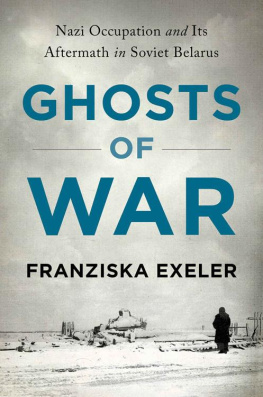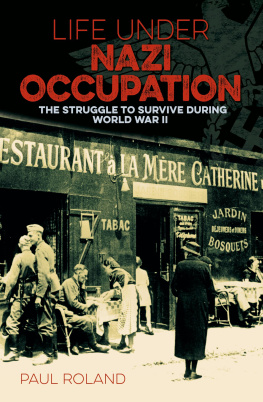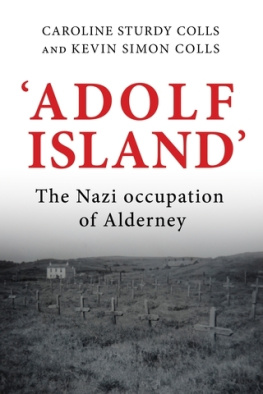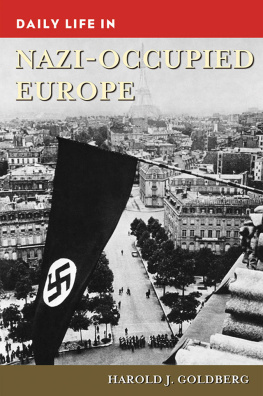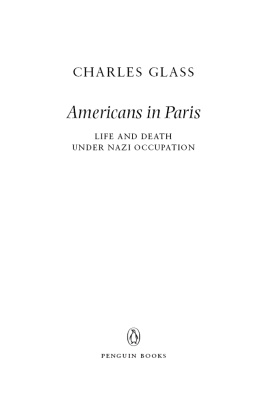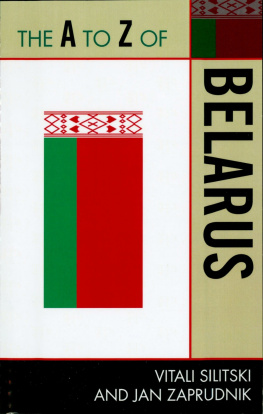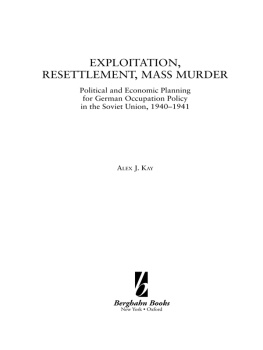Franziska Exeler - Ghosts of War: Nazi Occupation and Its Aftermath in Soviet Belarus
Here you can read online Franziska Exeler - Ghosts of War: Nazi Occupation and Its Aftermath in Soviet Belarus full text of the book (entire story) in english for free. Download pdf and epub, get meaning, cover and reviews about this ebook. year: 2022, publisher: Cornell University Press, genre: Politics. Description of the work, (preface) as well as reviews are available. Best literature library LitArk.com created for fans of good reading and offers a wide selection of genres:
Romance novel
Science fiction
Adventure
Detective
Science
History
Home and family
Prose
Art
Politics
Computer
Non-fiction
Religion
Business
Children
Humor
Choose a favorite category and find really read worthwhile books. Enjoy immersion in the world of imagination, feel the emotions of the characters or learn something new for yourself, make an fascinating discovery.
- Book:Ghosts of War: Nazi Occupation and Its Aftermath in Soviet Belarus
- Author:
- Publisher:Cornell University Press
- Genre:
- Year:2022
- Rating:3 / 5
- Favourites:Add to favourites
- Your mark:
- 60
- 1
- 2
- 3
- 4
- 5
Ghosts of War: Nazi Occupation and Its Aftermath in Soviet Belarus: summary, description and annotation
We offer to read an annotation, description, summary or preface (depends on what the author of the book "Ghosts of War: Nazi Occupation and Its Aftermath in Soviet Belarus" wrote himself). If you haven't found the necessary information about the book — write in the comments, we will try to find it.
Ghosts of War: Nazi Occupation and Its Aftermath in Soviet Belarus — read online for free the complete book (whole text) full work
Below is the text of the book, divided by pages. System saving the place of the last page read, allows you to conveniently read the book "Ghosts of War: Nazi Occupation and Its Aftermath in Soviet Belarus" online for free, without having to search again every time where you left off. Put a bookmark, and you can go to the page where you finished reading at any time.
Font size:
Interval:
Bookmark:
GHOSTS OF WAR
NAZI OCCUPATION AND ITS AFTERMATH IN SOVIET BELARUS
F RANZISKA E XELER
CORNELL UNIVERSITY PRESS
Ithaca and London
C ONTENTSGuide
F IGURESMaps
Figures
A CKNOWLEDGMENTSThis book has benefited tremendously from the intellectual guidance, conversations, and support that I was fortunate to receive over the course of my research and writing. The years at Princeton University were incredibly formative. I am very grateful for the mentorship of Stephen Kotkin, who always encouraged me to think more broadly about my manuscript. His incisive commentary and unrelenting support of the book have been invaluable along the way. I am also very grateful for the helpful input that I received from the other members of my dissertation committee, Jan T. Gross, Ekaterina Pravilova, and Amir Weiner.
I could not have imagined a better place than the International Center for the History and Sociology of World War II and Its Consequences at the Higher School of Economics in Moscow to further develop this book, and I thank Oleg Budnitskii, Liudmila Novikova, and my other colleagues at the center for providing such an exceptional, intellectually stimulating place. A Max Weber fellowship at the European University Institute provided the perfect place to exchange ideas with colleagues.
For the last several years, the Center for History and Economics at Magdalene College and Kings College at the University of Cambridge has been the most wonderful intellectual home and an incredibly supportive environment to think broadly across the fields about questions of law and society. I am deeply thankful to Emma Rothschild for her trust, her insightful commentary on my work, and her inspiring mentorship. I am also very grateful to Sunil Amrith, Tim Harper, Gareth Stedman Jones, Inga Huld Markan, and David Todd. Curating the Invisible Histories project with Diana Kim continues to be a tremendous pleasure. At Free University Berlin, where I have taught since 2016, the Global History team constitutes a big source of inspiration. I thank my colleagues, especially Samul Coghe, Sebastian Conrad, Valeska Huber, Christoph Kalter, Timothy Nunan, Ulrike Schaper, Thuc Linh Nguyen Vu, and Minu Haschemi Yekani, for long discussions, helpful comments, and in general for being such great colleagues.
I am very grateful for discussions with colleagues and fellow historians who at different stages of writing provided comments and help: Felix Ackermann, Tarik Cyril Amar, Seth Bernstein, Jeffrey Burds, Pey-Yi Chu, Michael David-Fox, Martin Dean, Sofia Dyak, Cristina Florea, Mayhill C. Fowler, Michael Gordin, Yoram Gorlizki, Jochen Hellbeck, Ulrike Huhn, Kristy Iron-side, Ilya Kukulin, Elidor Mhilli, Dirk Moses, Iryna Ramanava, Per Anders Rudling, David Shearer, Iryna Sklokina, Leonid Smilovitsky, Timothy Snyder, and Lynne Viola, with special thanks to Rachel Applebaum and Jared McBride. Aleksei Martiniuk made it possible for me to be affiliated with the Republican Institute of Higher Education in Minsk, which in turn enabled me to spend a year in Belarus. In Minsk, I thank Anatol Vialiki and Siarhei Novika for helping me locate archival materials and for so generously sharing their knowledge of Belarusian history with me. Ales Smalianchuk offered incisive comments at a critical juncture, for which I am very grateful. Our conversations in Grodno and Slonim were among the highlights for me that year. Aleksandr Litin introduced me to the Jewish community and history of Mogilev, and the wonderful Raisa Krivaltsevich opened her home for me both in Minsk and Novogrudok. I am deeply grateful to my interview partners who shared their experiences of the war and postwar years with me, and I thank Farid Berrashed, Elena Dokunova, Dina Fainberg, Raisa Krivaltsevich, Aleksandr Litin, Aleksei Martiniuk, Vadim Shmygov, Vladimir Sidortsov, Ales Smalianchuk, Leonid Smilovitsky, and Aleks Solod for their help in establishing contact with them. I am grateful to Racheli Yahav and her family for granting me permission to reproduce an image of her mother, Chasia Bornstein-Bielicka, in this book. At Free University Berlin, I would like to thank Marjory Ruiz for her editing skills. I am very grateful to my colleague Siarhei Bohdan for so generously sharing with me his expertise in Belarusian history and helping me with transliterations from Belarusian.
One of the best things about Princeton is its international community, and I treasure the friendships I made on campus. The weekly German-Russian conversations with Michael Meerson are much missed. To Catherine Abou-Nemeh, Nimisha Barton, Rohit De, Rotem Geva, Rohit Lamba, Arijeet Pal, Ronny Regev, Margaret Schotte, and Mareike Stollthank you so much for your friendship! I am very thankful to my friends in Berlin and elsewhere, Phillip Ayoub, Oren Bar-Tal, Ursula Giemann, Wolfram Knbich, Karsten Krauskopf, and Caroline Marburger, for keeping me sane.
This book is based on many months of research in more than a dozen archives, and I was fortunate to be able to draw on the kind and knowledgeable assistance of numerous historians, archivists, and librarians. I thank the staff at the different archives and libraries in Belarus, Russia, Israel, Germany, Poland, Ukraine, and the United States. I also thank the organizers of the many workshops, conferences, and panels at which I had the privilege to present my work over the years. The research for this book was supported by grants and fellowships from Princeton University; the Princeton Institute for International and Regional Studies; the Social Science Research Council (International Dissertation Research Fellowship, with funds from the Andrew W. Mellon Foundation); the Max Weber Program at the European University Institute; the International Center for the History and Sociology of World War II and Its Consequences at the Higher School of Economics in Moscow; the Programme on Exchanges of Economic, Legal, and Political Ideas, supported by the Andrew W. Mellon Foundation, at the Centre for History and Economics, Magdalene College and Kings College at the University of Cambridge; and Free University Berlin.
At Cornell University Press, I had the privilege to work with Roger Haydon, for whose insightful comments and support of the book I am very grateful. I would also very much like to thank Emily Andrew, Allegra Martschenko, Mary Kate Murphy, and Carolyn J. Pouncy for their editorial expertise and support of the book. I am incredibly grateful to the two reviewers (of whom Lynne Viola later revealed herself to have been one) for their very helpful comments. Mike Bechthold expertly drew the maps. Parts of the fourth chapter have been published as The Ambivalent State: Determining Guilt in the Post-World War II Soviet Union, Slavic Review 75, no. 3 (2016): 60629. Parts of the fifth chapter have been published as What Did You Do during the War? Personal Responses to the Aftermath of Nazi Occupation, Kritika: Explorations in Russian and Eurasian History 17, no. 4 (2016): 80535. Parts of the afterword have been published as Nazi Atrocities, International Criminal Law, and Soviet War Crimes Trials: The Soviet Union and the Global Moment of Post-Second World War Justice, in The New Histories of International Criminal Law: Retrials , ed. Immi Tallgren and Thomas Skouteris (Oxford: Oxford University Press, 2019), 189219.
And finally, to my familymy sister Dorothea and Steve with Rona and Johan; Barbara and Michael; Kristen; Friederike and Jonas with Jurekthank you so much for your support! I am deeply grateful to my parents, Ingrid and Ulrich, who always encouraged me to follow my interests and to do what I love to do. Lotte and Pauls arrival into this world brought a new perspective to the book; accompanying them on their journey fills my heart with so much joy. The biggest thanks of all, however, goes to Jasper for his support, love, and unrelenting encouragement over the yearsas questions turned into an idea and, eventually, into a book.
Next pageFont size:
Interval:
Bookmark:
Similar books «Ghosts of War: Nazi Occupation and Its Aftermath in Soviet Belarus»
Look at similar books to Ghosts of War: Nazi Occupation and Its Aftermath in Soviet Belarus. We have selected literature similar in name and meaning in the hope of providing readers with more options to find new, interesting, not yet read works.
Discussion, reviews of the book Ghosts of War: Nazi Occupation and Its Aftermath in Soviet Belarus and just readers' own opinions. Leave your comments, write what you think about the work, its meaning or the main characters. Specify what exactly you liked and what you didn't like, and why you think so.

